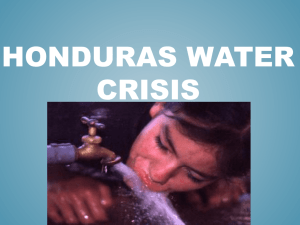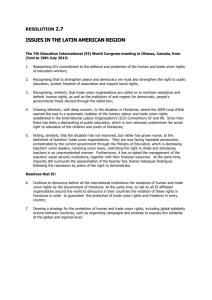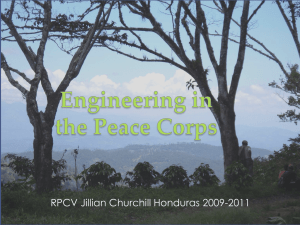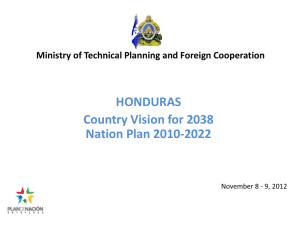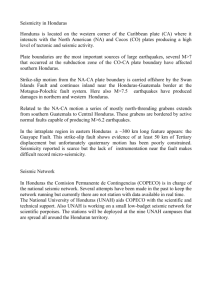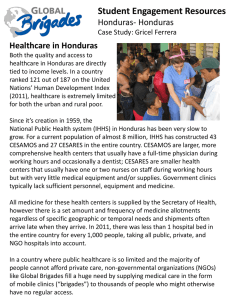In June, I travelled with the Legacy of Healing team to help six
advertisement
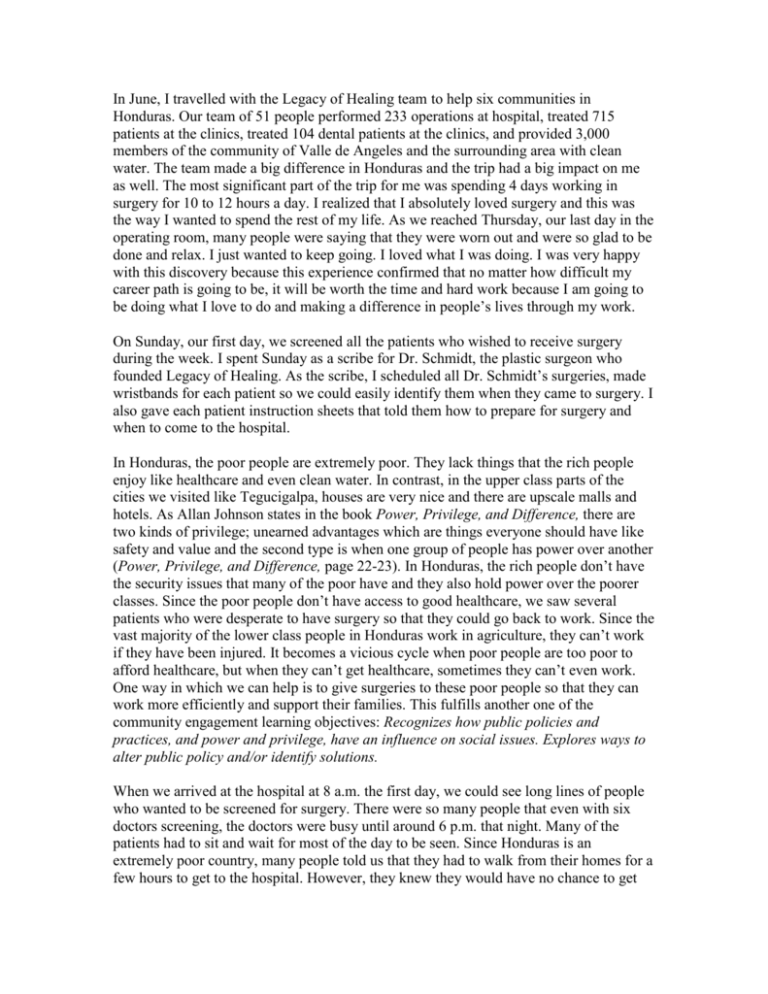
In June, I travelled with the Legacy of Healing team to help six communities in Honduras. Our team of 51 people performed 233 operations at hospital, treated 715 patients at the clinics, treated 104 dental patients at the clinics, and provided 3,000 members of the community of Valle de Angeles and the surrounding area with clean water. The team made a big difference in Honduras and the trip had a big impact on me as well. The most significant part of the trip for me was spending 4 days working in surgery for 10 to 12 hours a day. I realized that I absolutely loved surgery and this was the way I wanted to spend the rest of my life. As we reached Thursday, our last day in the operating room, many people were saying that they were worn out and were so glad to be done and relax. I just wanted to keep going. I loved what I was doing. I was very happy with this discovery because this experience confirmed that no matter how difficult my career path is going to be, it will be worth the time and hard work because I am going to be doing what I love to do and making a difference in people’s lives through my work. On Sunday, our first day, we screened all the patients who wished to receive surgery during the week. I spent Sunday as a scribe for Dr. Schmidt, the plastic surgeon who founded Legacy of Healing. As the scribe, I scheduled all Dr. Schmidt’s surgeries, made wristbands for each patient so we could easily identify them when they came to surgery. I also gave each patient instruction sheets that told them how to prepare for surgery and when to come to the hospital. In Honduras, the poor people are extremely poor. They lack things that the rich people enjoy like healthcare and even clean water. In contrast, in the upper class parts of the cities we visited like Tegucigalpa, houses are very nice and there are upscale malls and hotels. As Allan Johnson states in the book Power, Privilege, and Difference, there are two kinds of privilege; unearned advantages which are things everyone should have like safety and value and the second type is when one group of people has power over another (Power, Privilege, and Difference, page 22-23). In Honduras, the rich people don’t have the security issues that many of the poor have and they also hold power over the poorer classes. Since the poor people don’t have access to good healthcare, we saw several patients who were desperate to have surgery so that they could go back to work. Since the vast majority of the lower class people in Honduras work in agriculture, they can’t work if they have been injured. It becomes a vicious cycle when poor people are too poor to afford healthcare, but when they can’t get healthcare, sometimes they can’t even work. One way in which we can help is to give surgeries to these poor people so that they can work more efficiently and support their families. This fulfills another one of the community engagement learning objectives: Recognizes how public policies and practices, and power and privilege, have an influence on social issues. Explores ways to alter public policy and/or identify solutions. When we arrived at the hospital at 8 a.m. the first day, we could see long lines of people who wanted to be screened for surgery. There were so many people that even with six doctors screening, the doctors were busy until around 6 p.m. that night. Many of the patients had to sit and wait for most of the day to be seen. Since Honduras is an extremely poor country, many people told us that they had to walk from their homes for a few hours to get to the hospital. However, they knew they would have no chance to get surgery anywhere else so they walked there and waited for hours. It was unbelievable to see how many seemingly simple problems have gone untreated due to the poverty of the people and the lack of good medical care. These people who could not financially compensate us for our work, but they were able to thank us and they were very kind and appreciative. They gave us the rich experience of helping them, a gift much bigger for us than money. In this way, this trip fulfilled the first community engagement objective: Possesses awareness of purpose of service, including need for reciprocity, understanding of social issues, and ability to see those issues from multiple perspectives. On Monday, I was supposed to go help with intake at the clinic, but one of the students assigned to the operating room didn’t want to go, so the team switched me to the operating room. I was assigned to the plastic surgery operating room and I helped the nurses in that room set up. They taught me how to set up a sterile field and pitch things like gowns, blades, or whatever was needed onto the sterile field. I learned a lot from them. I assisted and observed the two surgeons in that room for the rest of the morning. After lunch, Ashley, one of the scrub techs suggested that I scrub cases in the minor room since they had many more patients to operate on and things weren’t moving quickly enough. Ashley taught me to put on sterile gloves by myself, what the different instruments were called, and she taught me how to set up. She set me up, and then headed into the other room to scrub a case. I scrubbed my first case with Dr. Cofino, a plastic surgeon from Guatemala. He seemed very intense at first. Halfway through, he asked me, "Why are your hands so shaky?” I answered, "This is my first time ever doing this job." and he said, “Oh, well that's a good reason!" I tried to learn very quickly. He taught me what angle to hand him instruments and made sure I really understood it. By the end of the day, I was getting my instruments and scrubbing cases without Ashley’s help. I learned a lot that day. I didn't even know what the instruments were called that morning and by then end of the day I had to get all the instruments from the Honduran nurses who spoke only Spanish. Before I went on the trip, I expected to slow the doctors down more than I helped. After all, I am a premed student who knows next to nothing about medicine yet, so what could I do to help? However, with help from Ashley and the others, I became a scrub tech. I scrubbed cases by myself, allowing us to run six operating tables at the same time. We saw 47 patients on our second day, a record for Legacy of Healing. Dr. Cofino and the scrub techs were willing to teach me how to help so that we could all work together to take care of as many people as possible. We saw a record number of patients because the team worked together so well. This fulfills another community engagement objective: Relates, communicates, and works effectively with others towards sustainable social change. As a premed student, this trip was an extremely valuable experience for me. I observed and assisted with many different kinds of surgeries including removing lipomas and cysts, breast reduction, breast reconstruction, carpel tunnel, trigger fingers, and many others. I learned a lot while scrubbing cases and observing. These skills will be very helpful to me someday when I’m a doctor. One of the plastic surgeons helped me remove a lipoma from a forehead and then I sutured it closed with him watching. The hand surgeon also showed me how to suture and another premed student and I closed for him after several cases so he could get ready for the next patient. Since Dr. Schmidt, one of the plastic surgeons, knew that I had just finished general chemistry at UC, he talked to me before we left about the different kinds of local anesthetics and what kinds of functional groups they were made with. He helped me use my knowledge of chemistry to explain why different kinds were used in different situations based on the pH and how infections affect it. Before the trip, I didn’t understand why physics is a required class for premed students because I didn’t see how it applies to medicine. However, Dr. Schmidt explained how physics applies to medicine including how he thinks about the angle when wiring a fractured mandible as well as why a bigger needle is used draw local anesthetic out of the bottle and then a smaller needle to inject. When I take physics next year, it will be much more interesting for me since I no know some ways in which it applies to medicine. As a violin performance major, I enjoyed the opportunity to take my violin along to Honduras and Costa Rica to play. Every morning, we began the day by singing worship songs and then hearing a brief devotional talk. Every morning, I played violin for those meetings. I enjoyed the chance to play every day before we worked. Many people said that the music helped to get their day off to a good start. After our work was done in Honduras, we went to Costa Rica to sightsee. We learned a lot about the animals and the climate. The team took a two-day whitewater rafting trip down the Pacuare river. I brought my violin along in a dry bag. With no power or internet access at the camp on the river, my violin was the evening entertainment. I played classical and fiddle music. The social issues in Honduras are very difficult to resolve and there is so little we could do with only two weeks to help. However, by engaging in projects like the Water Project portion of our trip, we can help in a more sustainable way. By constructing a clean water system, the team allowed the community of Valle de Angeles to have clean water for years to come. Clean water in Honduras will reduce disease, allowing medical care to be more available. We saw many people with genetic defects like polydactyly, a condition where people have a nonfunctional finger or toe on each of their hands and feet. In more affluent countries like the United States, this would be quickly and easily fixed at birth, but in Honduras, things like that go untreated for years and keep people from working effectively. In the future, I plan to go on many mission trips as a doctor to help as many untreated people as I can. I have shared my learning with my friends through my pictures. I put pictures and descriptions of them on my Facebook page and my honors portfolio blog page. I shared the link to my blog with friends so they can hear about my experience. Several of team members including me are planning to share the Legacy of Healing story at my church. One of the leaders of the team is creating a video using pictures from everyone’s cameras. The slideshow will be shown during a song with lyrics that reflect the mission of our team. The music group will record the song. I will be playing violin for that recording. We will all have a link to the video to share with our friends. As my friends see my pictures and hear my stories, I hope they will realize that making a difference in the lives of others is really what life is all about and that they can learn and grow from the experience of serving others. I also want more people to realize how much people in Central America need and how they can help. As I wrote about the experience and told others about it, I realized how much I love mission work and medicine. It helped me clarify in my mind that I want to spend the rest of my life making a difference in people’s lives through medicine and music.
